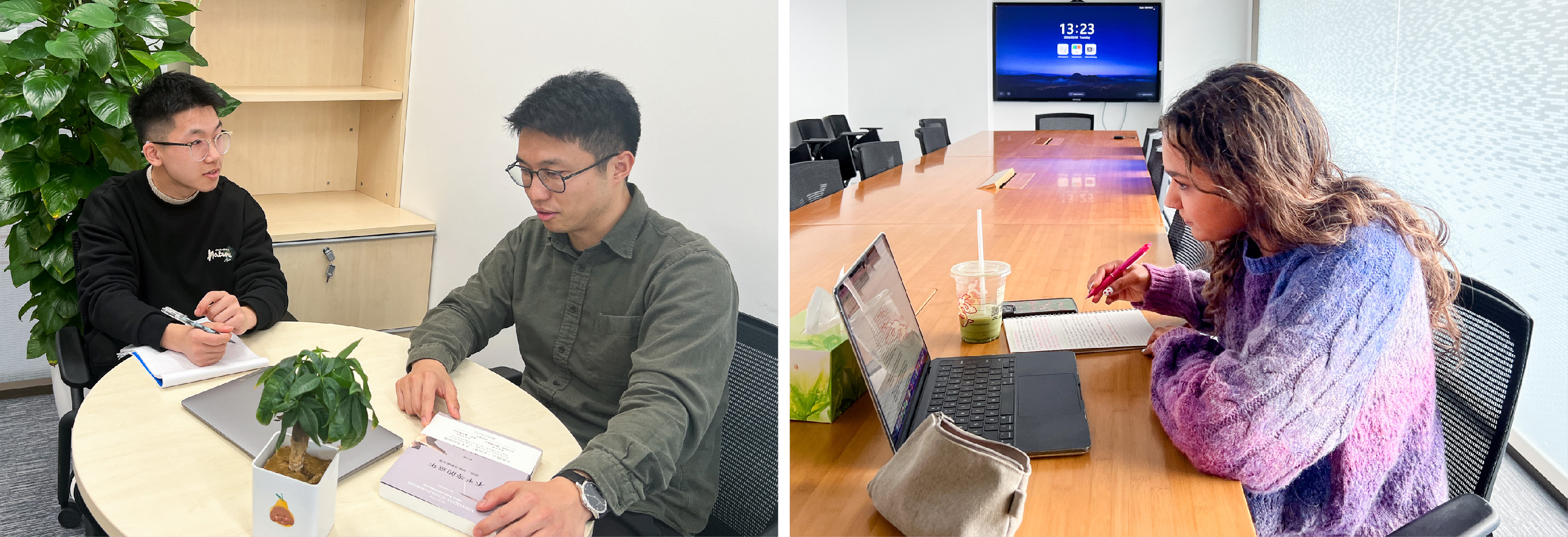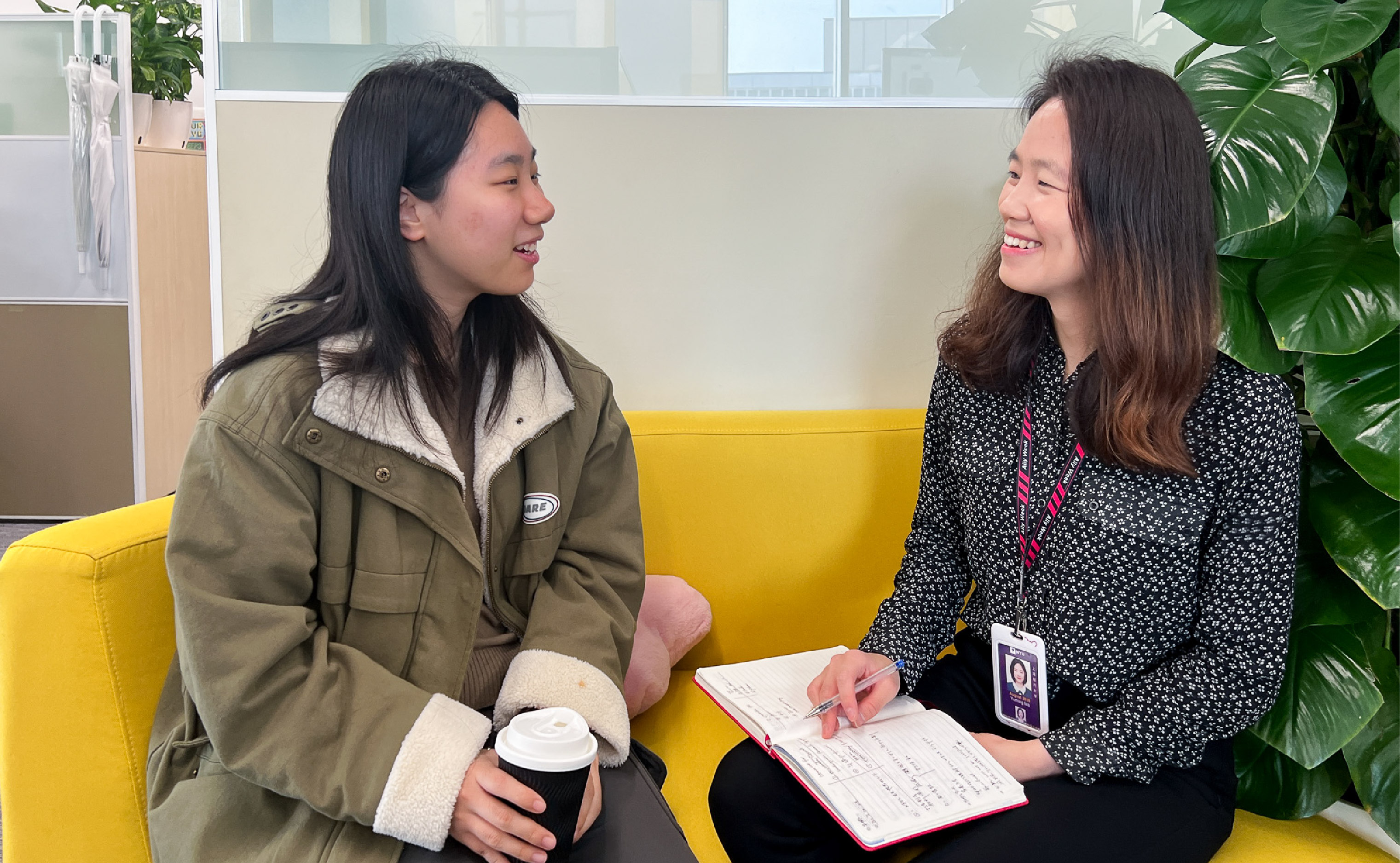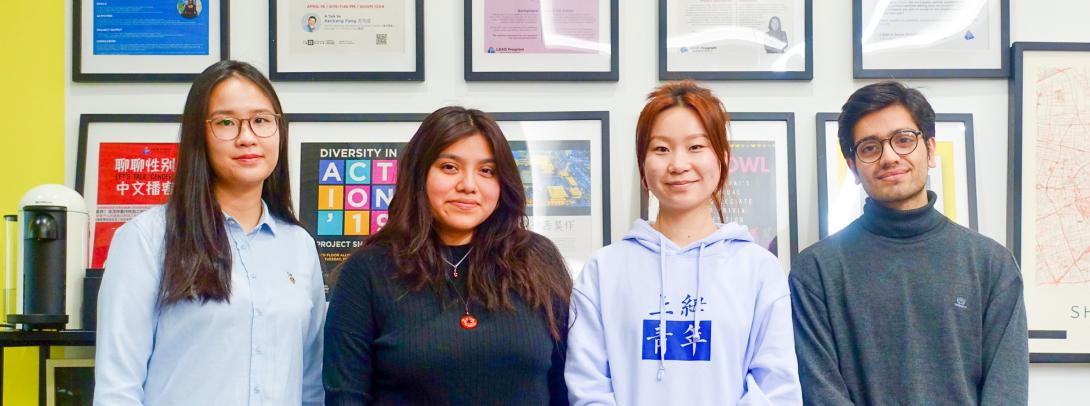Heading off to university can be a huge culture shock for anyone, but first-generation students, whose family members may not have attended university, face some special challenges. This semester, a student-run initiative under the Center for Student Belonging launched a mentorship program to build a needed community for these students at NYU Shanghai.
Mia Trinh ’24 is one of several students who brought together first-generation students during last spring’s Ally Week, a week-long series of activities that is part of the Center for Student Belonging’s LEAD Program. She says that afterward the students, wanting to continue that feeling of camaraderie, began advocating for a more robust support network for first-generation students, and the mentorship program was born.
Trinh, who grew up in Vietnam, says while students whose parents attended university benefit from advice on how to navigate university life, first-generation students are often at a disadvantage.
“My parents still don't know what my majors are to this day,” she says. “We wanted to form the First Generation Mentorship Program in order to address that gap and empower students who might not know where to look or what is possible out there.”
First-generation students are defined as the first in their families to attend university. While first-generation students make up more than half of the student population at US institutions of higher learning, the challenges they face are often overlooked.
In a survey sent out to the Class of 2027, the Center for Student Belonging found that about 20% of respondents identify as first-generation, with less than half the class answering. The Center believes the low response rate might be in part due to the stigma of being the first in the family to attend university. Manager Agnes Zhu says that the mentorship program hopes to tackle that stigma and has expanded the definition of first-generation students to include students whose families have no experience navigating university life at a unique Sino-American institution like NYU Shanghai.
Zhu, who was a first-generation student herself, says she faced hurdles during her graduate education. “My family really supported me from the emotional part, but they couldn’t give me some advice [for career planning and networking],” Zhu says.
First-generation students face several barriers to educational access, says Assistant Professor of Sociology Angran Li, ranging from the lack of role models who attended college to poor networking skills.
“They (first-generation students) don't have the social capital and the cultural capital to support them to succeed in college,” says Li. “That's the first barrier. And the second barrier is because they don't know anything about college, they don't have access to the available resources, (and) they may even feel alienated from the system.”

Left: Ken Guo ’26 (left) and Angran Li meet for their mentor and mentee check-in. Right: Shreya Jaisingh ’26 reflecting on a conversation with her mentor.
Li, who was the first in his family to attend college and also the first to attend university in the US, says he signed up to be a mentor to make an impact on the next generation.
“I see the differences among these two different systems. There are a lot of students in college facing different kinds of challenges, and to find the (sense of) belonging means to adapt themselves smoothly into college life. I think that's the core of this program,” says Li.
The First Generation Mentorship Program pairs up faculty and staff with students in need of support. 71 faculty and staff representing business, social science, economics, university affairs, writing programs, and humanities signed up to mentor 80 students from the US, China, and Europe, across majors from Data and Computer Science, Economics, and Interactive Media and Business.
Students are matched with mentors according to their field of study and career interests. Mentors meet with students three or four times throughout the semester, getting to know them and providing one-on-one advice. Sessions are optimized so that students receive individualized help, not only for job planning but also for navigating college life.
Shreya Jaisingh ’26 who grew up in Illinois, US, joined the mentorship program to help her build a network. “I thought it offered a really great path where I’d be able to learn from someone who's older than me…[and] also see how they can introduce me into the field that I'm interested in,” she says.
She was paired with Wang Yinglan, the deputy director of NYU Shanghai’s Law Department. Jaisingh says connecting with her mentor has helped her expand her career possibilities.
Jaisingh, who is majoring in international relations, says she originally considered going into law, but now is exploring other career paths and opportunities, including serving in the US Foreign Service as a diplomat. “Now I’m kind of leaning into diplomacy and more into the international relations aspect,” she says. “And so (my mentor) has been able to offer me a lot of insight already, just because she was working in the law field here in Shanghai and also in New York.”
The mentorship program also encourages students to reach outside of their comfort zone. Yao Yi ’27, a Shanghai local, says she joined the program to learn more about the resources offered at NYU Shanghai and to help her manage social anxiety. “I know nothing about the future,” she explains. “My parents haven't studied in foreign schools… and they cannot give me a lot of suggestions on career and studying. So I wanted to find a mentor to seek some advice,” Yao says.
Through the mentorship program, Yao has been able to receive valuable guidance that is enhancing her overall college experience. Her mentor has also encouraged her to challenge herself in new ways. “I'm kind of reluctant to meet my professor(s), but my mentor has encouraged me to make an appointment with them in the next two weeks,” Yao says.

Yao Yi ’27 talks with mentor Ma Yuming about her upcoming plans for the semester.
Her mentor Ma Yuming, who works in University Communications, says she advised Yao to meet with professors because it’s important to develop one-on-one relationships with faculty. That’s one way students can start to build lasting relationships, interpersonal skills, and self-confidence to carry with them beyond their college education. “I want her to have an experience of having that positive and healthy relationship with someone that you look up to,” Ma says.
That feeling of being able to help others and give back is one of the biggest draws for faculty and staff who volunteered to be mentors in the program. Academic Resource Center (ARC) Global Writing Fellow Scout Meredith Best was inspired to join the program as a mentor after experiencing difficulties adjusting to university life after being homeschooled for much of her youth. “I am only where I am today because other people have taken the same time for me,” Best says.
As the first-generation mentorship program develops, Agnes Zhu says she hopes that current student mentees will feel inspired to pay it forward too. “I think people can be proud of themselves as the first generation, and when they get support from this program then they can go on in the future to impact the whole community or the whole society.”


